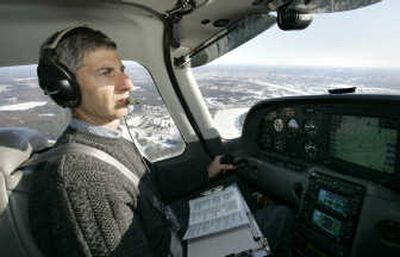Plane levy comes out of the blue

PORTLAND, Maine – When Steve Kahn got a $26,000 tax bill on his airplane, he thought Maine Revenue Services had made a mistake. Kahn lives, works and keeps his plane in Massachusetts.
It turns out the bill was no error. It was part of the agency’s efforts to collect taxes on aircraft owned by out-of-staters, even though they bought their planes elsewhere and brought them to Maine only to visit.
A number of other states, stretching from Florida to Washington, are doing the same as they grapple with budget shortfalls and the Internet makes it easier to track the comings and goings of aircraft.
Many pilots are outraged.
“At best, what Maine is doing is underhanded and devious. At worst it is illegal,” Kahn said. “Either way, it’s wrong.”
Maine officials say they are enforcing the state’s tax laws when they send bills – into six figures – to out-of-state plane owners.
At issue in Maine is the state’s “use tax,” which applies to many goods and services bought out-of-state that are not subject to sales tax. In the case of airplanes, tax officials say the law allows them to collect a 5 percent use tax from people who didn’t pay sales taxes on their planes if they brought their plane to Maine for more than 20 days, excluding time for maintenance and alterations, in the first year of ownership.
“We’re charged with administering the law,” said David Bauer, with Maine Revenue Services. “We didn’t write it.”
Use taxes have been on the books for decades, but the first time tax attorney Jon Block saw the state go after somebody who lives and keeps their plane out-of-state was three years ago.
Block, with the Pierce Atwood law firm in Portland, represents seven people from Massachusetts, Connecticut, Maryland and Florida who got bills this year ranging from about $16,000 to $175,000. His clients for the most part fly to Maine on business or to visit vacation homes.
“These people are dumbfounded,” Block said. “They feel like they’ve been taken to the cleaners.” He argues that in addition to being unfair, the precise wording of Maine’s use-tax law makes his clients exempt.
Other states are also stepping up efforts to collect use, lease and property taxes from out-of-state plane owners, said Louis Meiners, president of Advocate Aircraft Taxation Co. of Naples, Fla., a consulting firm for aircraft owners with 1,600 clients nationwide.
Washington state assesses a use tax of up to 8.9 percent if a plane is in Washington for more than 90 days in any continuous 12-month period.
These days, the Internet makes it easier for tax collectors to track planes’ whereabouts on the Internet or through FAA records, Meiners said. Some plane owners have gotten letters of inquiry and bills from multiple states demanding payment or proof that they’ve paid sales taxes in their home states, he said.
“What we have is a real potential for double-taxation and triple-taxation and endless taxation in the way the states try to enforce it,” he said.
Kahn, a partner in a Boston financial-services company, didn’t pay a sales tax when he bought his plane five years ago because Massachusetts exempts planes. He often flies to Rockland, Maine, to visit his vacation home. He also flies as a pilot in the national Angel Flight program to pick up patients in rural Maine and bring them to Boston-area hospitals free of charge.
He has appealed his tax bill. If his appeal fails, he could take the case to court. “I don’t mind paying taxes when I owe them, but this is underhanded,” he said.